Edie Melson's Blog, page 35
October 28, 2024
The Power of ONE in a Writer's Life
The writing road is an arduous journey. “Suddenly I question everything, especially my abilities as a writer, and I just want to turn and run the other way,” a writing friend said.
When we’re not making progress as we’d hoped, discouragement can set in, and temptation beckons us to turn away from our call. I’ve found it’s harder to go in the opposite direction than where God’s leading—which is forward.
Following Jesus means letting Him set the pace and carrying on as He calls, even when we don’t see results.
“My writing is amateur. But it’s still frustrating putting words out into the world to the sound of crickets.” she said.
“They set algorithm to trend only hate and propaganda. The Gospel or anything positive never trends,” another friend said. “If you watch trending lines, you can tell it’s being manipulated. It’s so negative.”
Sometimes I too get frustrated trying to be heard in this noisy world where often there’s less visibility of our posts than before the days of cancel culture and algorithms. But if God has called us to a task, shouldn’t we get to it? He knew our message and the challenges we’d face. The world is dark. Jesus commissioned his followers as the light of the world.
“Let your light so shine before men, that they may see your good works and glorify your Father in heaven.” (Matthew 5:16 NKJV)
The Gospel has never been trendy, but it still gets its work done—one by one. Jesus often took the time to minister to one person. He only had 12 apostles and not nearly as many followers as the Roman emperor Ceasar, or the Pharisees and Sadducees, the religious leaders of the day. And even Jesus’ few followers deserted Him for a time. That didn’t stop the Gospel.
Never mind what others are doing. Let’s focus on what God is doing and the work He has for us.
Sometimes we labor long and seem to lose rather than gain ground. I’ve offered my gospel tract as a free download via my blog’s resource page and social media and handed it out with candy on Halloween for years with little feedback. On Halloween 2023 I went to bed disappointed to have only given out a handful of tracts as fewer families than ever before showed up at our door.
Two days later, I received the following anonymous comment on my blog: “I meant to thank you for posting that Halloween tract. We had a very successful night and handed out 1,000 candy bags with tracts.”
Though we may not see it initially, when we’re faithful to serve as called, in His time and way, God blesses our harvest.
“Neither he who plants is anything, nor he who waters, but God who gives the increase.” (1 Corinthians 3:7 NKJV)
“I sometimes feel I have nothing new or important to say. There are a lot of words out there. Do mine matter?” another friend asked.
God created us with the desire to be a part of something greater than ourselves—for a purpose. We glorify God when we use our gifts to serve as He calls.
What if the words you write influence someone to not give up on life, or introduce one person to Jesus so they can know Him and make heaven their home?
“If we only lead one soul to Christ, we may set a stream in motion that will flow on when we are dead and gone.”—D.L. Moody
The Good Shepherd leaves the 99 to rescue the one lost sheep. Even if our words impact one or a few, what matters is that we obey God by sharing His truth. The work is worth the reward of the one who hears and follows Jesus.
What if the call right now is to encourage one person to go for their dream or embrace their calling so they can change the world?—Is that enough of a reason to write? What then if we quit?
In 1855, Sunday school teacher Edward Kimbal visited and shared the gospel with Dwight, a young shoe salesman. Dwight L. Moody became one of the leading evangelists of his time and is estimated to have preached to 100 million people.
In a letter to D.L. Moody’s daughter Emma, Rev. Billy Graham expressed the tremendous influence her father had on his life.
“I am wondering if you all are really aware of the many movements that now exist throughout the world that flowed from the ministry of Dwight Moody.”—Rev. Billy Graham.[1]
A February 2018 article by Lifeway Research stated the following about Billy Graham:
Persist. Serve. Write that one piece, share one more time. Then do it again. Never underestimate the power of one.
“Let us not grow weary while doing good, for in due season we shall reap if we do not lose heart.” (Galatians 6:9 NKJV)
Rachael M. Colby has a heart for reconciliation and a passion to uplift those who serve in tough places. She writes to connect cultures’ questions with Christianity’s answers, inspire faith, and motivate.
Rachael is an award-winning writer in the categories of articles, devotions, essays, poetry, flash fiction, and children’s picture books. She is a longtime member of The Jerry Jenkins Writers Guild and a protégé in the Cecil Murphey Mentoring program.
Her work has appeared in Chicken Soup for the Soul, the Blue Ridge Mountains Christian Writers Conference Blog, online publications, anthologies, and the Oak Ridger newspaper.
This Jamaican-born wife, mom, beach bum, artist, work in progress, makes her home in Cape Cod, Massachusetts. She runs on copious amounts of coffee, chocolate, and a whole lot of “Help me, Jesus,” and blogs at TattooItOnYourHeart.com.
[1]https://moodycenter.org/articles/billy-graham-and-d-l-moody-obedience-to-the-call-of-god/
October 27, 2024
When Writing in Deep POV Should I Use First or Third Person?
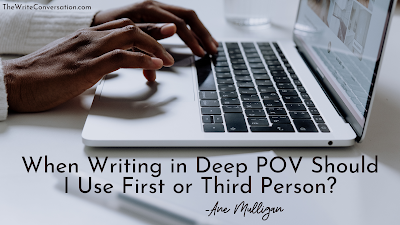
by Ane Mulligan @AneMulligan
I started writing my first book in 3rd person. My first 4 published books were in 3rd person. I learned to write in deep POV, taking my readers inside my character's head, and allowing them to go on the journey with him or her.
Then, something changed.
When I started In High Cotton , as I wrote the backstory, it came out in first person. And I loved it. Yes, there are certain constraints to writing first person, but it felt right.
Interestingly, I hadn't sold my first book yet, so I went back and rewrote the first couple of chapter in first person. Then, I sent it to my critique partners, asking them what they thought. Their reaction gobsmacked me.
They said that story was more intimate in third person because of the deep POV.
I learned something that day. Stories dictate how they want to be told. Here's another surprise: first person doesn't necessarily mean deep POV. The same "telling" words need to be watched. It's easy to think I can write:
I wondered if she'd tell everyone my secret.
However, better and deeper POV would be:
Is she going to tell my secret?
And yet another way that would work:
I know her. I never should have told her. She's going to blab it all over town. How could I have been so stupid?
Telling vs showing come into play when writing deep POV. You've got to write WHAT your character thinks, sees, and experiences from inside their head. That's how your readers will feel like they are inside the story.
From my WIP, Listen To Your Heart:
It’s tech week—that strength-sucking, sleep-robbing, hair-pulling five days of working out all the bugs from a production before opening night. Five loooonnng days, when I wish we had another month.
I hate it.
And I love it.
A small tweak can bring this deeper:
It’s tech week—that strength-sucking, sleep-robbing, hair-pulling five days of working out all the bugs from a production before opening night. Five loooonnng days. Egads, I need another month.
I hate it.
And I love it.
Here's a third person example:
Of all the days to be late. Claire Bennett stormed up the boardwalk toward Dee's 'n' Doughs. Any other day, the storefronts with their brightly striped awnings, created a cherry rainbow on Sandy Shores Drive. Not today. Skullduggery was afoot in Chapel Springs.
Having a number of books under my belt now, I would tweak that like this:
Of all the days to be late. Claire Bennett stormed up the boardwalk, her sights set on Dee's 'n' Doughs. Any other day, the colorful storefronts were a rainbow of cheer. She squinted. Not today. Skullduggery was afoot in Chapel Springs.
A small change, but one that keeps it deep in Claire's POV.
Deep POV takes work, but when you master it—or at least have a good handle on how it's done (do we ever master this craft?) it lets your readers experience the story with your character.
TWEETABLEWhen Writing in Deep POV, Should I Use First or Third Person? @AneMulligan on @EdieMelson (Click to Tweet)
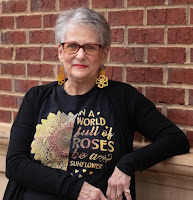 Ane Mulligan lives life from a director’s chair, both in theatre and at her desk creating novels. Entranced with story by age three, at five she saw PETER PAN onstage and was struck with a fever from which she never recovered—stage fever. One day, her passions collided, and an award-winning, bestselling novelist emerged. She believes chocolate and coffee are two of the four major food groups and lives in Sugar Hill, GA, with her artist husband and a rascally Rottweiler. Find Ane on her website, Amazon Author page, Facebook, Instagram, Pinterest, The Write Conversation, and Blue Ridge Conference Blog.
Ane Mulligan lives life from a director’s chair, both in theatre and at her desk creating novels. Entranced with story by age three, at five she saw PETER PAN onstage and was struck with a fever from which she never recovered—stage fever. One day, her passions collided, and an award-winning, bestselling novelist emerged. She believes chocolate and coffee are two of the four major food groups and lives in Sugar Hill, GA, with her artist husband and a rascally Rottweiler. Find Ane on her website, Amazon Author page, Facebook, Instagram, Pinterest, The Write Conversation, and Blue Ridge Conference Blog.
October 26, 2024
Take Your Writing Fears & Turn Them into Writing Confirmation
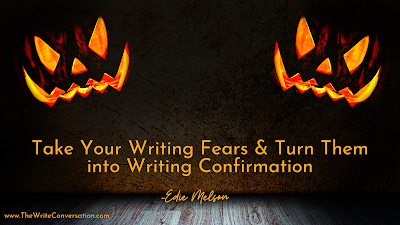
by Edie Melson @EdieMelson
I know there are a lot of things writers are afraid of. The trick is not to let those fears keep us from writing. The list of things I'm afraid of—in regards to writing—is long and some of the things there are ridiculous. But I learned a long time ago, we are all afraid of silly things. So, since the scariest season is at hand, I'm going to try to give you a different way of looking at some of the most common fears.
Writing Fears Turned Upside Down
1. Fear of Having our Writing Rejected. I had to face this one first, when I was freelancing and sending out articles. I dreaded going to the mailbox and seeing the SASE (Self Addressed Stamped Envelope) Yes, I know I'm old and now it's an email, but the fear is the same.
My Upside Down: Instead of letting each rejection make me more insecure I turned this fear upside down. I discovered that sending out submissions is a lot like making sales calls. You have to send out so many to get a yes. When I began writing, I found out that if I sent out ten submissions, I was almost guaranteed that at least 1 - 2 of them would say yes. So each rejection was just one more number on the way to a yes!
When I began sending out book proposals, the mindset was a little different. There wasn't a magic number (like 10) that guaranteed me acceptance. Instead, I prayed over each submission and asked God to make sure the yes came from the company He chose. So each no meant God had a better plan for my book. It was my job to remain obedient, patient, and faithful.
2. Fear of Writing a Proposal. This one maybe more of a dread or intense dislike. But I know it's something we all have to do eventually—if our plan is to write a book. At first it was hard for me to find anything good about this difficult process. UNTIL I discovered every successful author I talked to said the same thing, "I HATE writing proposal!"
My Upside Down: So I took my intense dislike and fear of writing a proposal as confirmation that I truly am a real writer!
3. Fear of Submission. This could be any kind of public submission of your writing, from a proposal, article, even submitting for a critique. And I truly dreaded this because I desperately wanted to be good enough as a writer to succeed.
My Upside Down: My upside down for this one began with Scripture, Submit yourselves, then, to God. Resist the devil, and he will flee from you (James 4:7 NIV). As writers, we’re constantly being called to submit, even if we don’t realize it. Of course there’s the obvious connection, when we submit our writing for possible publication. But there are other ways as well.
4. Fear of Choosing. This one crops up as we're faced with multiple opportunities. It could be as simple as which publisher to send our work to or trying decide between multiple requests from a writing conference. My fear behind choosing was the fear of choosing wrong. The question that haunted my mind was this, "What if I choose something other than God's best?"
My Upside Down: Again, the answer to this fear came from God's word. Specifically Acts 16:6 - 10. In this section Paul sets out, after prayer, to head to Asia to share the good news. We see in this section how the Holy Spirit turns Paul and keeps him from going there. Instead Paul ends up in Europe. So how does this help us as writers?
First, when we submit to God (see #3 above) we can trust God to keep us on track—even if God has to turn us around. Next, God is able to get my attention and keep me from messing up. God isn't some vicious entity, sitting on His throne in Heaven and waiting to laugh at us when we get it wrong. NO. God is our loving Father who desires to see us follow the path He has for us. Finally, God isn't keeping score. He doesn't get mad and punish us if we get it wrong. Nowhere in this passage do we see how God is disappointed in Paul, or ashamed Paul didn't get it right. Nope, God just works things out so Paul goes exactly where God intended.5. Fear of Missing My Chance. Let's face it, life happens. Sometimes there are circumstances in our lives that postpone our call to write for days or even years. When that happens, we can begin to give up and assume we missed our chance and God is done with us.
My Upside Down: I've had lots of detours throughout my writing journey. Often I assume because I "missed" the timing, my opportunity was gone. Experience has taught me that is a lie. All those detours? They have worked together to put me in the exact right place, at the exact right time. Again, I find my confirmation in God's Word, For the gifts and the calling of God are irrevocable. (Romans 11:29 ESV) God will never abandon us and He is always waiting for us to return.
These are some of my top fears and how I've turned them into faith and confirmation. I have 2 questions for you (feel free to answer one or both):
How do you deal with your writing fears?What writing fears can we help you put into perspective?Be sure to leave your thoughts in the comments section below and don't forget to join the conversation!
Blessings,EdieTWEETABLETake Your Writing Fears & Turn Them into Writing Confirmation from @EdieMelson (Click to Tweet)
 Edie Melson is a woman of faith with ink-stained fingers observing life through the lens of her camera. No matter whether she’s talking to writers, entrepreneurs, or readers, her first advice is always “Find your voice, live your story.” As an author, blogger, and speaker she’s encouraged and challenged audiences across the country and around the world. Her numerous books reflect her passion to help others develop the strength of their God-given gifts and apply them to their lives.Connect with her on her WEBSITE, through FACEBOOK, X (FORMALLY TWITTER) and on INSTAGRAM.
Edie Melson is a woman of faith with ink-stained fingers observing life through the lens of her camera. No matter whether she’s talking to writers, entrepreneurs, or readers, her first advice is always “Find your voice, live your story.” As an author, blogger, and speaker she’s encouraged and challenged audiences across the country and around the world. Her numerous books reflect her passion to help others develop the strength of their God-given gifts and apply them to their lives.Connect with her on her WEBSITE, through FACEBOOK, X (FORMALLY TWITTER) and on INSTAGRAM.
October 25, 2024
Harnessing AI for Writers: Boosting Productivity and Creativity

by Zena Dell Lowe @ZenaDellLowe
In the digital age, artificial intelligence (AI) is revolutionizing various fields, and the realm of writing is no exception. While some writers are skeptical about integrating AI into their creative process out of fear that it may dilute the authenticity of their work or replace human creativity altogether, the truth is that AI can be an invaluable tool for enhancing productivity and fostering creativity. By leveraging AI, writers can streamline their workflow, overcome writer's block, and refine their craft in ways previously unimaginable.
Common Objections to Using AI in Writing
Despite its potential, many writers express concerns about using AI. A common objection is the fear that AI might produce generic or soulless content, lacking the nuanced touch of a human writer. Others worry about becoming overly reliant on technology, potentially losing their unique voice or creative instincts. Additionally, there's a concern about ethical implications, such as the authenticity of AI-generated content and the potential for misuse.
These concerns are relevant and ought not be overlooked. However, when used thoughtfully, AI can complement and enhance a writer's abilities rather than replace them. AI offers practical solutions to everyday challenges faced by writers, enabling them to focus more on the creative aspects of their work and unlock new levels of efficiency and inspiration.
To illustrate how AI can be a powerful ally, let’s explore the top ten ways I personally use AI in my writing and professional endeavors.
Top 10 Ways I Use AI to Enhance My Writing and Productivity
1. Writing and Editing Support:AI helps me draft, revise, and refine various forms of written communication, such as emails, differentiation statements, and other professional documents. This ensures clarity, professionalism, and effectiveness in my interactions.
2. Screenplay Development:AI assists in brainstorming, outlining, and developing my screenplay projects. It evaluates scenes in detail, helps refine character arcs, and maintains story coherence, making the creative process more streamlined and efficient.
3. Feedback and Critique Assistance:Crafting thoughtful and constructive feedback for my clients' works is crucial. AI ensures my responses are clear, supportive, and professional, helping me maintain high-quality client relationships.
4. Podcast and Course Content Creation:For my podcast episodes and writing courses, AI helps develop engaging hooks, intros, and outros. It also aids in designing content that captivates and educates my audience effectively.
5. Administrative Support:Managing and organizing administrative tasks can be time-consuming. AI assists in drafting professional emails and handling scheduling communications efficiently, freeing up more time for creative work.
6. Marketing and Promotion:Creating promotional materials and marketing strategies is essential for my courses, podcasts, and upcoming book. AI helps craft compelling pitches and differentiation statements that resonate with my target audience.
7. Research and Knowledge Enhancement:Staying informed about current trends in screenwriting and publishing is crucial. AI provides detailed information and insights on various topics, helping me remain relevant and knowledgeable in my field.
8. Content Structuring:Structuring and organizing content for my non-fiction book on story structure is a significant task. AI ensures the content is coherent, engaging, and aligns with my unique perspective on story structure.
9. Client Communication:Maintaining clear and professional communication with clients is vital. AI ensures my responses are timely and address their concerns effectively, enhancing client satisfaction and trust.
10 Brainstorming and Idea Generation:AI acts as a brainstorming partner, generating new ideas and perspectives for my writing projects. This collaboration enhances creativity and productivity, leading to more innovative and compelling content.
Embracing AI: Enhancing Creativity and Productivity
Integrating AI into the writing process does not mean relinquishing creative control; rather, it’s about leveraging technology to enhance one's abilities and streamline workflow. AI can handle repetitive tasks, provide instant feedback, and offer new perspectives, allowing writers to focus on creating compelling stories and engaging content. Moreover, AI's support in brainstorming and idea generation can help overcome writer's block, providing fresh inspiration and facilitating creative breakthroughs.
Conclusion: Inviting Writers to Embrace AI
Incorporating AI into your writing routine can be a game-changer. It’s not about replacing human creativity but about augmenting it with powerful tools that can help you achieve more in less time. By embracing AI, you can overcome common writing challenges, enhance your productivity, and unlock new levels of creativity.
I invite you to explore the potential of AI in your own writing journey. Whether you're drafting a novel, developing a screenplay, or managing a professional writing career, AI can offer valuable support and insights. Don't let fear or skepticism hold you back from harnessing the power of technology. Embrace AI as your writing partner and discover how it can transform your creative process. Let AI handle the heavy lifting, so you can focus on what truly matters: your story.
TWEETABLEHarnessing AI for Writers: Boosting Productivity and Creativity, @ZenaDellLowe on @EdieMelson (Click to Tweet)
 Zena has worked professionally in the entertainment industry for over 20 years as a writer, producer, director, actress, and story consultant. Zena also teaches advanced classes on writing all over the country. As a writer, Zena has won numerous awards for her work. She also has several feature film projects in development through her independent production company, Mission Ranch Films. In addition to her work as a filmmaker, Zena launched The Storyteller’s Mission with Zena Dell Lowe, a podcast designed to serve the whole artist, not just focus on craft. In 2021, Zena launched The Storyteller’s Mission Online Platform, where she offers advanced classes and other key services to writers. Zena loves story and loves to support storytellers. Her passion is to equip artists of all levels to achieve excellence at their craft, so that they will truly have everything they need to change the world for the better through story.
Zena has worked professionally in the entertainment industry for over 20 years as a writer, producer, director, actress, and story consultant. Zena also teaches advanced classes on writing all over the country. As a writer, Zena has won numerous awards for her work. She also has several feature film projects in development through her independent production company, Mission Ranch Films. In addition to her work as a filmmaker, Zena launched The Storyteller’s Mission with Zena Dell Lowe, a podcast designed to serve the whole artist, not just focus on craft. In 2021, Zena launched The Storyteller’s Mission Online Platform, where she offers advanced classes and other key services to writers. Zena loves story and loves to support storytellers. Her passion is to equip artists of all levels to achieve excellence at their craft, so that they will truly have everything they need to change the world for the better through story.To find out more about Zena or her current courses and projects, check out her websites at WWW.MISSIONRANCHFILMS.COM and WWW.THESTORYTELLERSMISSION.COM
October 24, 2024
Wordle and Writing: What to Do When You Fail

by Lori Hatcher
How many Wordle players do we have out there?
For the uninitiated, Wordle is a web-based game where players try to guess a five-letter word in six tries or less. Participants receive feedback after each guess. Wordle has a daily solution, and everyone attempts to guess the same word. During 2023, Wordle was played 4.8 billion times.
So yes, I see your hands.
We’re word nerds. We love opportunities to exercise our knowledge of the English language, whether we’re writing a short story, editing a blog post, or competing with thousands of other word lovers to guess the winning word.
My husband and I are latecomers to the game, which became public in 2021. Each morning, after breakfast and devotions, we open the Wordle app and try to guess the word of the day. We had a 42-day winning streak going, feeling all smug and smart, until Saturday, October 5.
Wordle gurus declared the winning word for that day “easy and straightforward.” Apparently not for us. After six unsuccessful attempts, our unbroken, self-satisfied Wordle streak ended when we guessed trial, giver, wiper, biker, cider,and miser, but not MINER.
Waaah!
As I examined the wounds of our defeat, I realized that playing Wordle parallels the writing journey.
Sometimes, we tap a few letters on the keyboard and, voila! we win. All our letters turn green, and we receive an acceptance letter, a publishing credit, or a book contract.
Other times, we slog away, one letter at a time, getting some right and some wrong. Maybe we need to hone our craft or polish our prose before our work is a winner. Slowly, slowly, word by frustrating word, we get better at the writing game. We pick up a few new subscribers, receive an invitation to contribute to an anthology, or get an email from a reader about how our words cheered her soul.
Some days, we try our best (or maybe we don’t), and our results look as grey as those dismal grey tiles on the Wordle game. This one was tricky. Try again tomorrow, some well-meaning expert tells us.
October 5 comes to every writer (and every Wordler). “Failing” at Wordle, just like “failing” at writing, isn’t the end of the world.
The questions failure inspires reveal a lot about us.
Will I try again or set it aside? There’s no right answer, but in the writing life, we must seek God’s will and obey it.Is there something I can learn from my failure? The answer is yes. Always yes. What will we do to become a better writer? Attend a conference? Take an online course? Subscribe to a writers blog?Will I let my failure demoralize me, or will I receive it as an opportunity to grow? Grow in humility as others critique our work. Grow in our willingness to learn. Grow in our compassion for others who are also struggling.Will I focus on the joy of playing or only on the joy of the win? Human standards of “winning” in the writing game usually include royalties, best-seller status, or national attention. These pleasures are as fleeting as cookies in a room full of teenagers. Winning in God’s eyes is characterized by faithful, prayerful, Spirit-led perseverance. It’s caring more about obedience than accolades. It’s offering the sacrifice of our service on the keys of our computers.
On Sunday, October 6, my husband and I clicked open the Wordle app, ready to restart our winning streak.
And we lost.
Again.
But you know what? Tomorrow morning, we’ll try again. In the meantime, we’ll read a few Wordle blogs, look for ways to grow our vocabulary, and determine to play for the joy of playing.
Whether we win or lose, we’ll be better for having played.
And you will be better for having written.
Now it’s your turn. Are you a Wordler? What lesson have you learned from the game that could apply to your writing life? Share your thoughts in the comment box below and join the conversation.
If you’d like to check out the game, CLICK HERE to visit the website.
TWEETABLEWordle and Writing: What to Do When You Fail from author Lori Hatcher on @EdieMelson (Click to Tweet)
 Lori Hatcher loves to inspire and equip others by sharing high-impact stories for spiritual transformation. A popular women’s ministry speaker and writing/speaking instructor, Lori writes for Our Daily Bread, Focus on the Family, Guideposts, Revive Our Hearts, and Crosswalk.com. Check out her latest devotional, A WORD FOR YOUR DAY: 66 DEVOTIONS TO REFRESH YOUR MIND, from Our Daily Bread Publishing. Connect with her at LORIHATCHER.COM or on FACEBOOK.
Lori Hatcher loves to inspire and equip others by sharing high-impact stories for spiritual transformation. A popular women’s ministry speaker and writing/speaking instructor, Lori writes for Our Daily Bread, Focus on the Family, Guideposts, Revive Our Hearts, and Crosswalk.com. Check out her latest devotional, A WORD FOR YOUR DAY: 66 DEVOTIONS TO REFRESH YOUR MIND, from Our Daily Bread Publishing. Connect with her at LORIHATCHER.COM or on FACEBOOK.
October 23, 2024
Coping with a Writer's Fear of the Blank Page
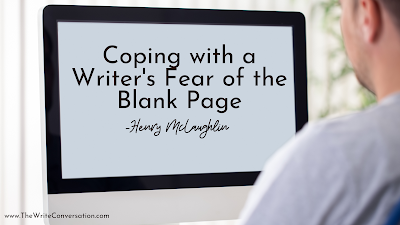
by Henry McLaughlin @RiverBendSagas
Get it down. Take chances. It may be bad, but it's the only way you can do anything really good. William Faulkner
How many of us hesitate to start writing? Even authors who have been at it for a while have this hesitation.
This is sometimes referred to a writer’s block. Sometimes, writer’s block comes because we have no idea what to write next.
Sometimes, it comes out of fear. Like the fear we can’t write, that we’re only deluding ourselves if we think we have talent. Or the fear our story is junk that no one will ever want to read.
It’s the fear of failure for writers.
I think Faulkner gives wise advice in the quote above.
There are times the blank page stares back, accusing and ridiculing. Our fingers freeze over the keyboard. And we let it defeat us. This has happened to me over and over. When it does, I turn away and go do something else. And when I come back the page is still empty.
This happened recently as I was my work in progress. When I looked at my notes of what needs to be fixed, the page laid there, daring me to come up with something.
I next tried to write this blog several times without success. Ideas wouldn’t come or, if they did, I’d dismiss them as trite.
I skimmed my folder of ideas, rejecting one after the other, until I found this quote from Faulkner. The simple truth of it smacked me upside my head.
A blank page is a dark hole.
A page with words on it is something I can work with. It may stink, but I can see it and tweak and rewrite until it’s something worthwhile.
I looked at my work in progress. Instead of revising, I began a scene between my protagonist and antagonist. As I wrote, I discovered some of the protagonist’s deeper motivations. He became a more complex character which adds nuance to the story that was there before.
The key is to write. Something. Anything. One sentence may trigger a whole chapter that will take our story in a new and better direction.
Write an incident from our protagonist’s past. Something that happened before the story began. It may reveal a new aspect to explore and develop. It may show the story world in an entirely new light, one that peels back layers to show deeper insights into our story.
Or create a scene where a secondary has the POV and gives his or her assessment of the protagonist. It can be funny or penetrating.
As Nora Lofts says, “I can fix a bad page. I can’t fix a blank page.”
What are some of the things you do to overcome a blank page?
TWEETABLECoping with a Writer's Fear of the Blank Page from Henry McLaughlin (@RiverBendSagas) on @EdieMelson (Click to Tweet)
 Henry’s debut novel, Journey to Riverbend, won the 2009 Operation First Novel contest.
Henry’s debut novel, Journey to Riverbend, won the 2009 Operation First Novel contest.Henry edits novels, leads critique groups, and teaches at conferences and workshops. He enjoys mentoring and coaching individual writers.
Connect with Henry on his BLOG, TWITTER and FACEBOOK.
October 22, 2024
9 Characteristics of a Seasoned Writer

by DiAnn Mills @DiAnnMills
A seasoned writer is not one who has been attempting publication for years, but a person who has successfully achieved their dream of publication and is striving to reach more writing goals. I’ve been writing and publishing for nearly thirty years. Changes in the industry, marketing, promotion, social media, and reader preferences keep me on my toes. The following traits will help the success and longevity of your writing career.
Tips to Grow as a Seasoned Writer
1. DisciplineSeasoned writers understand developing writing habits.Adhere to a writing schedule that reflects their priorities and how their mind works.“Get it down. Take chances. It may be bad, but it’s the only way you can do anything really good.” William Faulkner
2. Strong, Writing VoiceSeasoned writers develop their voice by writing and writing some more.Use word choice, tone, genre, point of view, and syntax woven with the writer’s uniqueness to ensure the writing flows in a distinct style. “A word after a word after a word is power.” Margaret Atwood
3. AdaptabilitySeasoned writers view success by staying current with industry trends.Read daily what is going on in the publishing industry—all of it. “Either write something worth reading or do something worth writing.”Benjamin Franklin
4. Attention to DetailSeasoned writers practice editing, striving for perfection.Keep a list of editing aids, resources, and tools. Don’t skip the process.“Let me live, love, and say it well in good sentences.” Sylvia Plath
5. Thick SkinSeasoned writers understand rejections and criticism are part of the writing life.Determine if the criticism is valid and edit if needed."This manuscript of yours that has just come back from another editor is a precious package. Don't consider it rejected. Consider that you've addressed it 'to the editor who can appreciate my work' and it has simply come back stamped 'Not at this address'. Just keep looking for the right address" Barbara Kingsolver
6. Continuous Learning and CuriositySeasoned writers explore the world by reading and learning in a never-ending quest for knowledge and improvement.Stay up to date with the world, its people, culture, and pursue a hunger for knowledge that affects all you do–not just writing.“The only people who achieve much are those who want knowledge so badly that they seek it while the conditions are still unfavorable. Favorable conditions never come.” C.S. Lewis
7. Network with Fellow WritersSeasoned writers invest time to participate with other writers by giving back to the writing community.Step into a writing group, either in person or online, that fuels your heart and mind with meaningful relationships. Share and practice the art of friendship.“The delicate balance of mentoring someone is not creating them in your own image but giving them the opportunity to create themselves.” Steven Spielberg
8. ProfessionalismSeasoned writers meet deadlines, practice the business side of writing, value organization, and breathe integrity.Spend time studying the business side of writing and prioritize means to stay organized.“I've heard some writers say things like, 'Well, I'm a professional writer. I only start books I know I can finish.' I look at it maybe the other way: I only want to write books I'm not sure I can write.” Markus Zusak
9. Personal GrowthSeasoned writers ensure they grow and change during the writing of each new book.Challenge yourself to measure growth mentally, intellectually, and spiritually.“If I ever think I’m too big to help a writer, God may think I’m too small for publication.” DiAnn Mills
The journey of becoming a seasoned writer is worth the ups, downs, publications, and rejections. These characteristics have helped me through the years, and they might help you. Do you have a tip to grow as a seasoned writer?
TWEETABLE9 Characteristics of a Seasoned Writer from @DiAnnMills on @EdieMelson (Click to Tweet)
 DiAnn Mills is a bestselling author who believes her readers should expect an adventure. She creates action-packed, suspense-filled novels to thrill readers. Her titles have appeared on the CBA and ECPA bestseller lists; won two Christy Awards; and been finalists for the RITA, Daphne Du Maurier, Inspirational Readers’ Choice, and Carol award contests.
DiAnn Mills is a bestselling author who believes her readers should expect an adventure. She creates action-packed, suspense-filled novels to thrill readers. Her titles have appeared on the CBA and ECPA bestseller lists; won two Christy Awards; and been finalists for the RITA, Daphne Du Maurier, Inspirational Readers’ Choice, and Carol award contests. She is the former director of the Blue Ridge Mountain Christian Writers Conference, Mountainside Marketing Retreat, and Mountainside Novelist Retreat with social media specialist Edie Melson. Connect here: DiAnnMills.com
October 21, 2024
20 Scary Things People Actually Say to Writers
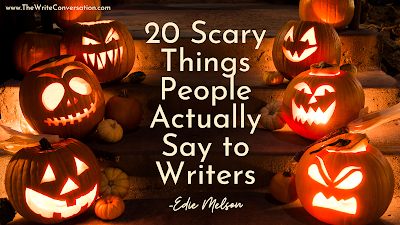
by Edie Melson @EdieMelson
In honor of October I thought I’d dust off this old post and share it again. It truly is scary what people will say to writers without thinking!
I’ve also added my rebuttals to some of these thoughtless observations, and I’m happy to report that I’ve yet to give into the temptation to utter them aloud, no matter how badly I wanted to.
Top 20 Scariest Things People say to Writers!
1. Are you published? (I really don’t have the space here to get into this. I usually just do a mental eye-roll.)
2. I have an idea for something you should write about. We could split the profits. (Yeah, I do all the work and you get half of almost nothing. Sounds like a deal to me…)
3. I wrote a book, can you contact your publisher/agent for me? (You really wouldn’t like what I had to say about you.)
4. Why don’t you take the day off, it’s not like you work for a living. (unprintable reply)
5. Can I read your manuscript? (Like I don’t have enough stress in my life already.)
6. Writing must be the easiest job in the world. (If you like 20-hour days, pennies per hour, horrific critiques, and serving up your heart for others to chew on daily.)
7. Anyone can write a book, what else do you do? (see number 6)
8. You should get that published. (Really? Like I hadn’t thought of that.)
9. I’ve heard that if you….you’ll be a much better writer. (Nothing I like better than advice from someone who has no clue.)
10. Aren’t you finished with that yet? (I am. I just decided not to submit it.)
11. I hate reading, it’s such a waste of time. (unprintable reply)
12. Have you ever written anything I might have read? (Yes. If morons could read.)
13. Will you read my manuscript? (*running and screaming in the other direction*)
14. Are you still doing that writing thing? (Believe me, if I could quit, I would.)
15. When can I get your book for free? (What part of “I do this for a living” do you not understand?)
16. Can you edit/write my essay for me? (I write commercially, not academically. There is a difference.)
17. Will you make me a character? (Only if I can kill you.)
18. What do you do with all your spare time? (in the vein of number 17, why don’t you come over and find out…)
19. Writing, can you make a living at that?
20. Writing, it must be nice to make so much money for not doing anything.
I’d love for you all to share your experiences with funny responses as the people around you commented on your writing life.
Don’t forget to join the conversation!Blessings,Edie
TWEETABLE20 Scary Things People Actually Say to Writers from @EdieMelson (Click to Tweet)
 Edie Melson is a woman of faith with ink-stained fingers observing life through the lens of her camera. No matter whether she’s talking to writers, entrepreneurs, or readers, her first advice is always “Find your voice, live your story.” As an author, blogger, and speaker she’s encouraged and challenged audiences across the country and around the world. Her numerous books reflect her passion to help others develop the strength of their God-given gifts and apply them to their lives.Connect with her on her WEBSITE, through FACEBOOK, X (FORMALLY TWITTER) and on INSTAGRAM.
Edie Melson is a woman of faith with ink-stained fingers observing life through the lens of her camera. No matter whether she’s talking to writers, entrepreneurs, or readers, her first advice is always “Find your voice, live your story.” As an author, blogger, and speaker she’s encouraged and challenged audiences across the country and around the world. Her numerous books reflect her passion to help others develop the strength of their God-given gifts and apply them to their lives.Connect with her on her WEBSITE, through FACEBOOK, X (FORMALLY TWITTER) and on INSTAGRAM.
October 20, 2024
Book Marketing Begins with the Proposal

by Karen Whiting @KarenHWhiting
Whether you go traditional or indie, book proposals kickoff the marketing and define the book. It's a great way to help plan your marketing before you write.
Book Hooks and Descriptions Make Good Marketing copy
When aspiring writers ask, why does a publisher want a hook and two or three other descriptions of the book? It's because it sets up the marketing. Certain lengths create back cover copy while others create great for catalogs. The short hook will be your media pitch and a basis for the press release. One of my first books, on finger puppets for ministry leaders, I used a hook of, 'Let your fingers do the teaching' and the published had it in bold, red letters across the top of the back cover.
The Competition Is a Well of Promotional Ideas
The comparison in the market analysis helps refine your book ideas and defines the uniqueness. Those comparable books also let you check out how the other books in the category are being marketed. Follow those authors and keep track of interviews, pitches, and more for ideas on how to promote your book. Even for my current proposal for tweens, I picked up new phrases to use in marketing.
The Audience and Need for the Book
Wow! What a great section to fill in. Describing the needs also reveals the benefits of the book which make great selling points. Defining the audience helps you know who you will market to wile you are also realizing their needs. That should be a great place to revisit when you're ready to create posts and blogs. I usually seek out articles and statistics for this section and find data that helps me in marketing. One study from the Barna report on moms gave me great insights into what moms need. Another Barna study listed ten reasons teens and young adults leave the church that inspired me to add elements that would keep them in church by addressing what caused them to go, such as adding in more science since one reason was believing the lie that God and science are opposed to one another.
Affinity Groups
These are groups to connect with as you list the, Join their FB groups and get active so you can market to them later. One friend joined specific dog breed groups and later wrote a book with that breed as the main character. She identified them as affinity groups and sold lots of copies to the members when the book released.
Summaries of chapters or sections of the book
The summaries give condensed versions of concepts and make good blog posts. They may also contain some anecdotes or stories for interviews. Once it's closer to a release date, I go to the summaries in the proposal and brainstorm ideas for articles, talks, and blog posts. That's what usually lands media interviews and articles in magazines.
Characters and Plots in Fiction, plus Research
Again, all the write up about the plot and people in the book provide material for posting. The research can be jumping off points for travel articles, blog posts, and more. Research on health, disasters, or other issues can be marketing aspects to share information. I wrote a short story on literacy and can tie that to a handout on helping children read better. I'll use it with my future teen book releases at homeschool shows because improving literacy improves book reading and buying.
The Contents
Even the chapter titles and divisions of your book provide fodder for marketing. A Chapter that grabs attention is also a talking point for interviews and an idea for articles. Any special features like reflective questions, sidebars, and factoids provide ideas for articles later and tip sheets to use as freebies. My list of archeology sites and artifacts in my upcoming book is in a spread sheet and will be easy to use for interview pitches and blog posts.
The Marketing Section
This is the big section where you brainstorm and list what you can do to market the book. At this point the book concept is new and you're probably brimming over with ideas and know what the book will matter to readers. Consider what you can do in each major method of marketing: print, media, social media, speaking, and expertise. List ideas you can do to connect with the audience like freebies, videos, special calendar date activities related to the book, postcard campaigns, and ideas specific for the book. Be sure you will follow through on what you list. Check out calendar dates for marketing idea. The Jewish celebration Tu B’Shvat, the New Year for Trees so the proposal includes an online event to celebrate this with my botany book. Some traditional publishers add the list into the contract to make sure you will follow through.
If you are a new author, that you can add in training you've taken or signed up to take in the marketing section. So, consider what you need such as speaker trainer. podcast training, etc.,. Also start building databases of media you can pitch to, meeting planners for speaking, and blogs for which you can write guest posts.
Once Book is Complete Revisit the Proposal
After the book is completed, it's time to revisit the proposal and set the marketing in motion. That also when you can start reaching out and use these descriptions as pitches and connections for marketing.
TWEETABLEBook Marketing Begins with the Proposal from @KarenHWhiting on @EdieMelson (Click to Tweet)
 Karen Whiting (WWW.KARENWHITING.COM) is an international speaker, former television host of Puppets on Parade, certified writing and marketing coach, and award-winning author of twenty-seven books for women, children, and families. Her newest book, The Gift of Bread: Recipes for the Heart and the Table reflects her passion for bread and growing up helping at her grandparent’s restaurant. Check out her newest book Growing a Mother’s Heart: Devotions of Faith, Hope, and Love from Mothers Past, Present, and Future. It's full of heartwarming and teary-eyed stories of moms.
Karen Whiting (WWW.KARENWHITING.COM) is an international speaker, former television host of Puppets on Parade, certified writing and marketing coach, and award-winning author of twenty-seven books for women, children, and families. Her newest book, The Gift of Bread: Recipes for the Heart and the Table reflects her passion for bread and growing up helping at her grandparent’s restaurant. Check out her newest book Growing a Mother’s Heart: Devotions of Faith, Hope, and Love from Mothers Past, Present, and Future. It's full of heartwarming and teary-eyed stories of moms.Karen has a heart to grow tomorrow’s wholesome families today. She has written more than eight hundred articles for more than sixty publications and loves to let creativity splash over the pages of what she writes. She writes for Crosswalk. Connect with Karen on Twitter @KarenHWhiting Pinterest KarenWhiting FB KarenHWhiting.
October 19, 2024
A Fall Clean-Up for Writers

by Tammy Karasek @TickledPinkTam
I have a question for you writers—have you ever thought about a scheduled clean-up of the items in your office and writing world? I’m referring to a big overhaul like we do with a Fall clean up around our homes, like raking leaves, putting away the lawn mower once cleaned, and clearing flower beds.
There are many items we need to clean up and out of our offices or writing spaces. I have found I not only need the proverbial spring clean, but this fall clean has become a necessary for me.
Here are the items I put effort into cleaning up to help make my office space less cluttered and more conducive to productivity.
A Fall Cleaning To-Do List for Writers
We need to clean out our files.
I don’t know about you, but I find I have a couple copies of pieces I’m working on that I didn’t realize I had. For instance, my fiction WIP (work-in-progress) had seven first chapters in the file. All with different word counts, which left me somewhat confused which one was the most current. Off to scrivener to find out which one matched so I could keep that one in the current file. Time wasted that I should have paid attention when I compiled it over…sigh.
Discard old critique group sheets no longer needed.
If you have already sent in the guest blog post, wrote the book or changed the entire 1500 submission you had critiqued—throw out all the returned critique pieces, whether online or printed sheets. No need to keep them around taking up space. Besides, if some might have been harsh or non-constructive help, you have permission to pitch them and get the negative out. Jus’ sayin’.
Once cleaned, now organize your files.
This may be a no-brainer for most people, but if you haven’t thought about organizing your files by their usage, do that now. Depending on the items you save in Word, create master file folders to keep them by category. Some might be House, Insurance Info, Conference Recording, Writing Info, etc. For my personal writing, I have a main folder that says My Writing Pieces. Within that folder I have subfolders for The Write Conversation, Blue Ridge Blog, Contest Submissions, My Blog Posts, each of my books, etc. Bottom line, the organization of the files needs to fit you, your file topics and how you would use them or look for them.
Back up your computer(s) to an external hard drive or iCloud.
Whichever is your choice to save your work, protection of that work is important. If something happens to your computer, it’s comforting to know it can be retrieved from your choice of back-up. Don’t forget your iPad and cell phones as well. I’m often surprised to hear writers say they don’t do an extra back up because their computer has an automatic back up. It makes me shudder to think if they lose their computer in any way, their info could be gone for good.
Purge pens, pencils and erasers.
Here’s where I’m telling on myself. I’m not going to lie to you, I love my pens and pencils. Take me to a stationery store, I’m going to be there a while—much like a bookstore. I want to look at all the new “shiny!” But we need to be honest, sometimes we bought a pen because others might have said how much they love to write with it, but it was “meh” for us. Build a plastic bag of them and give them to a teacher friend. They are always in need of pens and pencils for their classrooms and are so appreciative of the gift. Clear out ones you’ll never use to be able to find and use the ones you do enjoy.
Purge and replenish office supplies.
I don’t know about you, but I have always loved back-to-school time for office supplies. I love a deal, but I also love all the new pens, markers, and more. Should you need to replenish, there are still some back-to-school deals to be had on printer ink, printer paper, pens, markers, and post-its. I do love my post-its! (You might have noticed a consistent theme here – I love office supplies!)
Clear your reference book shelf.
Self-explanatory, but are there any reference books you find you’ve read so many times you no longer pull out to look through? Bag them up and take to your next writing group meeting or pass to a new writer you may be mentoring. They will appreciate the book coming from you, especially with your recommendation of the book.
Now as we get ready to hunker down from our lighter schedule of summer and go into our writing caves, let’s give our writing spots a good clean-up. Maybe even move your furniture around a little for a different view as you write. This always gives me an extra boost of excitement to show up to my writing spot each day—tidy room, new arrangement—a win for sure. I may even add a fall candle to sweeten up my area, too.
What about you? Do you find after summer you like to tidy up your writing spot or office and get ready to pour out your creativity into your writing? Share below what your favorite thing to do to change up your writing spot once fall arrives, we’d love to hear what you think.
TWEETABLEA Fall Clean-Up for Writers from @TickledPinkTam on @EdieMelson (Click to Tweet)
 Tammy Karasek uses humor and wit to bring joy and hope to every aspect in life. Her past, filled with bullying and criticism from family, drives her passion to encourage and inspire others and give them The Reason to smile. She’s gone from down and defeated to living a “Tickled Pink” life as she believes there’s always a giggle wanting to come out! A writer of Romance—with a splash of sass. She’s also The Launch Team Geek helping authors launch their books and also a Virtual Assistant for several best-selling authors. Don't miss her recent book, LAUNCH THAT BOOK, just released in November.
Tammy Karasek uses humor and wit to bring joy and hope to every aspect in life. Her past, filled with bullying and criticism from family, drives her passion to encourage and inspire others and give them The Reason to smile. She’s gone from down and defeated to living a “Tickled Pink” life as she believes there’s always a giggle wanting to come out! A writer of Romance—with a splash of sass. She’s also The Launch Team Geek helping authors launch their books and also a Virtual Assistant for several best-selling authors. Don't miss her recent book, LAUNCH THAT BOOK, just released in November. Her work was also published in a Divine Moments Compilation Book—Cool-inary Moments. She’s also the Social Media Manager for the Blue Ridge Mountains Christian Writers Conference, Founding President and current Vice-President of ACFW Upstate SC, and Founding President of Word Weavers Upstate SC. She’s a writing team member for The Write Conversation Blog, Novel Academy, MBT Monday Devotions, The Write Editing and more. Connect with Tammy at HTTPS://WWW.TAMMYKARASEK.COM.



